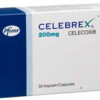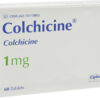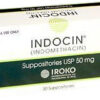Generic Name and Formulation
Indocin’s generic name is indomethacin. It belongs to the class of nonsteroidal anti-inflammatory drugs (NSAIDs). It is available in multiple formulations including oral capsules, suppositories, and injectable forms. Oral capsules are commonly prescribed, available in various dosages.
Therapeutic Uses
Indocin is primarily used for relieving moderate to severe pain. It is prescribed for conditions like arthritis, gout, and ankylosing spondylitis. Physicians may also use it to reduce inflammation and joint swelling, improving physical function for patients. It’s essential for treating specific musculoskeletal disorders.
Mechanism of Action
Indocin works by inhibiting cyclooxygenase (COX) enzymes. This inhibition reduces the synthesis of prostaglandins. By decreasing prostaglandin levels, Indocin reduces inflammation and pain both, offering symptomatic relief without addressing the underlying disease cause. Its efficacy lies in its anti-inflammatory properties.
Pharmacokinetics Details
After administration, Indocin is rapidly absorbed, predominantly in the gastrointestinal tract. Indomethacin has a half-life of approximately 4.5 hours. It is metabolized primarily in the liver. Excretion occurs mainly via the kidneys, with some metabolism in the intestines.
Dosage Recommendations
The recommended dosage varies based on the condition treated. For rheumatoid arthritis, doses typically begin at 25 mg taken two to three times daily. Dosage can be adjusted based on clinical response, but daily intake usually does not exceed 200 mg. Acute gout treatment typically starts with a higher initial dose, followed by a tapering regimen.
Drug Interactions Overview
Indocin may interact with various drugs, influencing their effects. Concomitant use with anticoagulants increases bleeding risk. Use with lithium may elevate lithium blood levels. Combining with diuretics or antihypertensives may reduce their effectiveness. Regular monitoring and dosage adjustments might be necessary in these cases.
Considerations for Administration
Indocin should be taken with food or milk to minimize gastrointestinal discomfort. If prescribed in capsule form, they should not be crushed or chewed. Suppository form requires rectal administration. Healthcare providers should emphasize adherence to prescribed dosage schedules for best results.
Storage and Stability Information
Indocin should be stored at room temperature, away from excessive moisture and heat. Avoid direct sunlight exposure. Keep in its original container to maintain stability and efficacy. Oral formulations should remain dry, away from humid areas like bathroom cabinets.
Population-Specific Use
The use of Indocin in elderly populations requires careful consideration due to increased susceptibility to adverse effects. Pediatric use should only occur under strict medical supervision. In pregnant or breastfeeding women, alternative treatments might be preferred due to potential fetal risk.
Adverse Reactions Guide
Common adverse reactions include gastrointestinal discomfort such as nausea and indigestion. Central nervous system effects like dizziness or headache may occur. More severe effects include gastrointestinal bleeding or renal impairment. Monitoring for these reactions is critical during treatment.
Monitoring Requirements
Regular monitoring of renal and hepatic function may be necessary during prolonged therapy with Indocin. Periodic complete blood counts can help assess hematic side effects like anemia. Monitoring blood pressure is crucial to detect any NSAID-induced hypertension.
Patient Counseling Points
Patients should be informed about the potential for gastrointestinal side effects and the importance of reporting any signs of bleeding. They should be advised on the correct usage of different formulations. Encourage open communication with healthcare providers about any other medications being taken concurrently.





Reviews
There are no reviews yet.